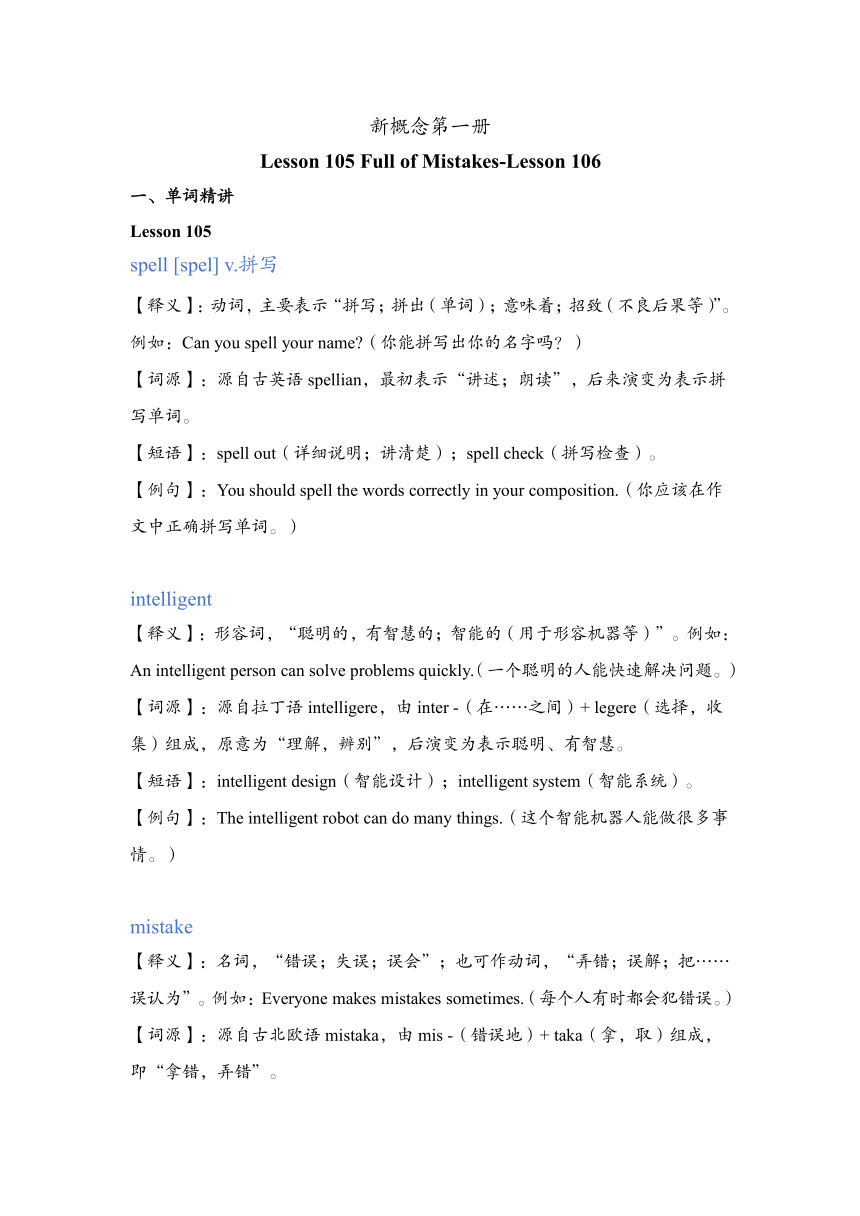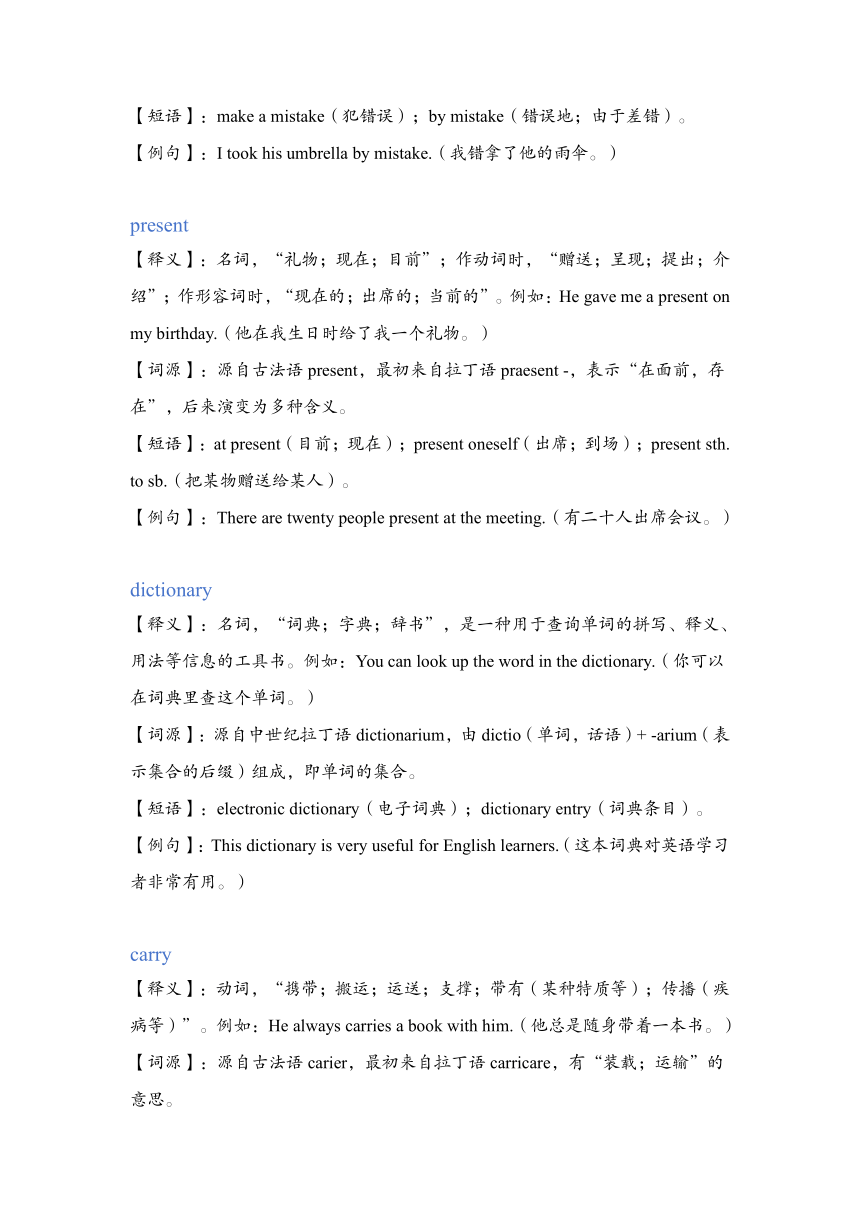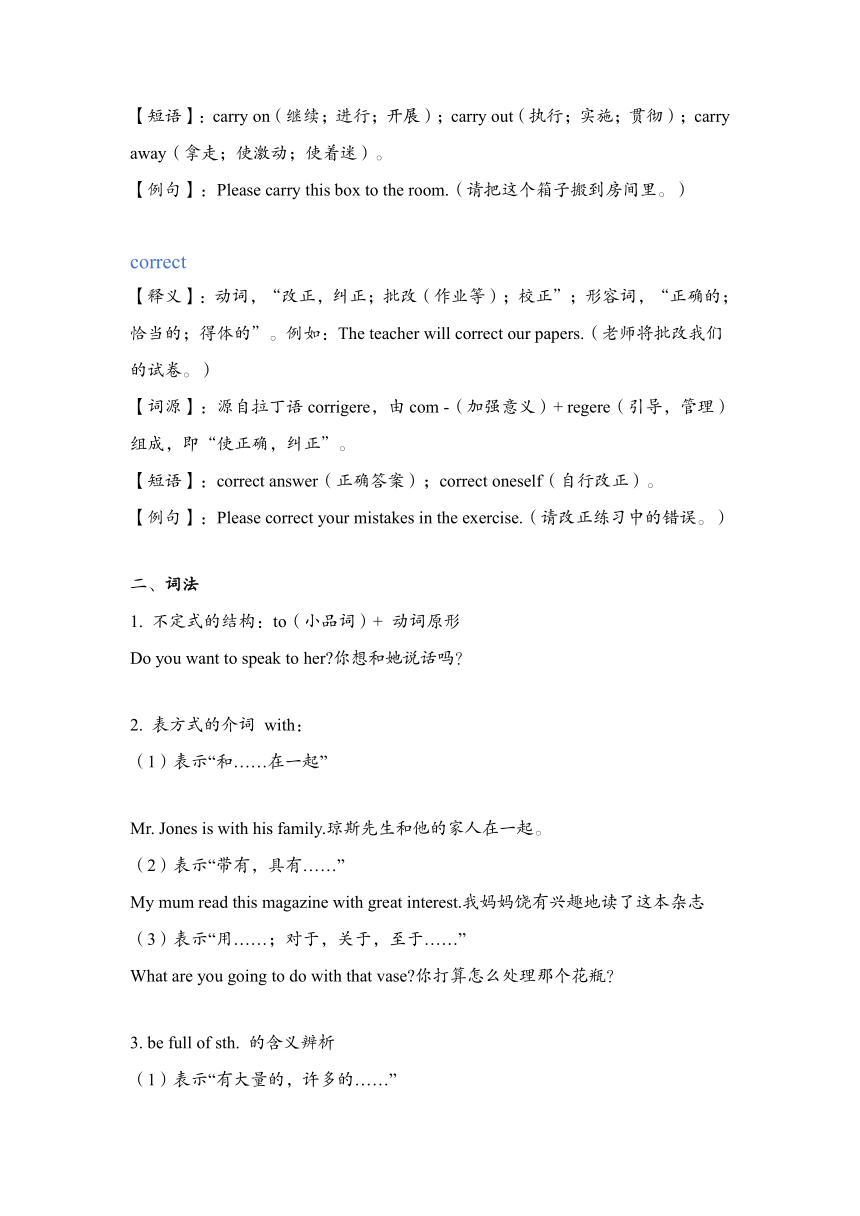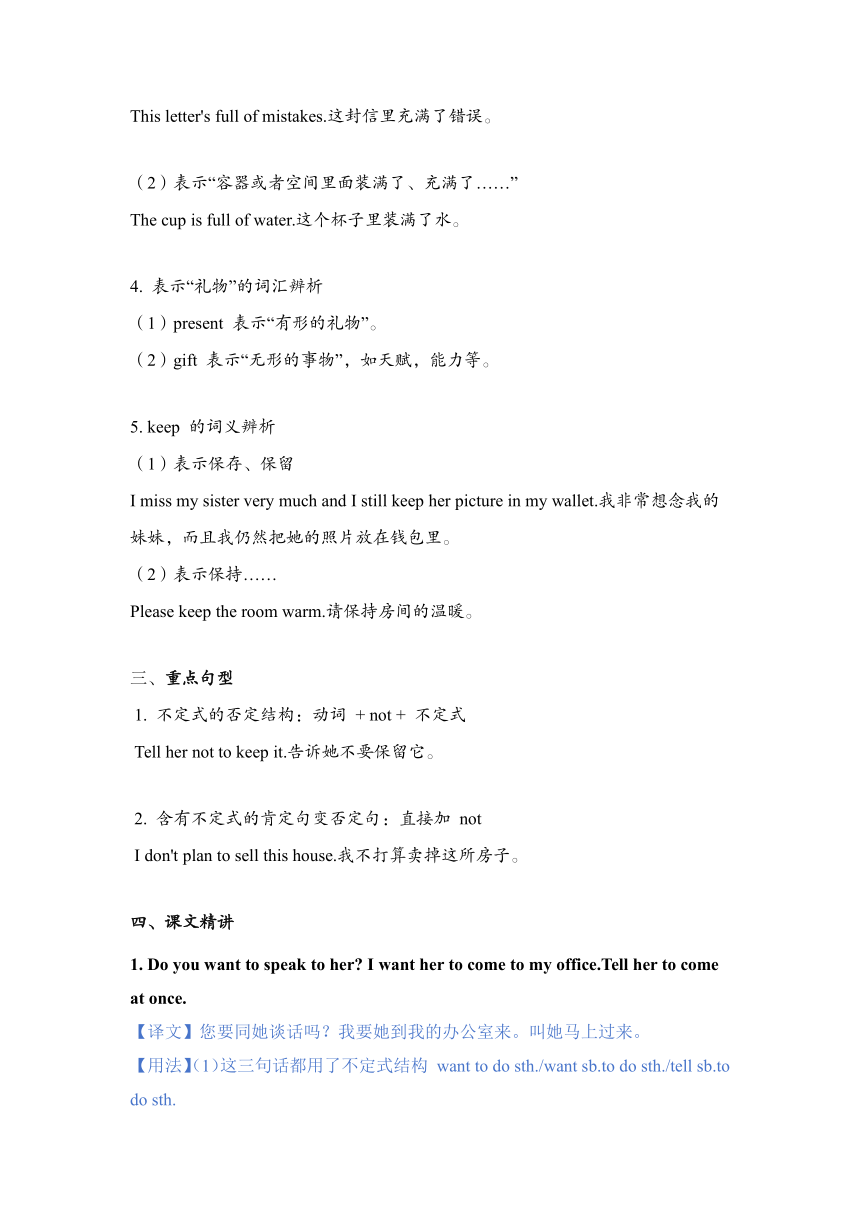新概念第一册Lesson 105 Full of Mistakes-Lesson 106讲义
文档属性
| 名称 | 新概念第一册Lesson 105 Full of Mistakes-Lesson 106讲义 |  | |
| 格式 | docx | ||
| 文件大小 | 125.9KB | ||
| 资源类型 | 教案 | ||
| 版本资源 | 新概念英语 | ||
| 科目 | 英语 | ||
| 更新时间 | 2024-12-03 21:56:39 | ||
图片预览




文档简介
新概念第一册
Lesson 105 Full of Mistakes-Lesson 106
单词精讲
Lesson 105
spell [spel] v.拼写
【释义】:动词,主要表示“拼写;拼出(单词);意味着;招致(不良后果等)”。例如:Can you spell your name (你能拼写出你的名字吗?)
【词源】:源自古英语spellian,最初表示“讲述;朗读”,后来演变为表示拼写单词。
【短语】:spell out(详细说明;讲清楚);spell check(拼写检查)。
【例句】:You should spell the words correctly in your composition.(你应该在作文中正确拼写单词。)
intelligent
【释义】:形容词,“聪明的,有智慧的;智能的(用于形容机器等)”。例如:An intelligent person can solve problems quickly.(一个聪明的人能快速解决问题。)
【词源】:源自拉丁语intelligere,由inter -(在……之间)+ legere(选择,收集)组成,原意为“理解,辨别”,后演变为表示聪明、有智慧。
【短语】:intelligent design(智能设计);intelligent system(智能系统)。
【例句】:The intelligent robot can do many things.(这个智能机器人能做很多事情。)
mistake
【释义】:名词,“错误;失误;误会”;也可作动词,“弄错;误解;把……误认为”。例如:Everyone makes mistakes sometimes.(每个人有时都会犯错误。)
【词源】:源自古北欧语mistaka,由mis -(错误地)+ taka(拿,取)组成,即“拿错,弄错”。
【短语】:make a mistake(犯错误);by mistake(错误地;由于差错)。
【例句】:I took his umbrella by mistake.(我错拿了他的雨伞。)
present
【释义】:名词,“礼物;现在;目前”;作动词时,“赠送;呈现;提出;介绍”;作形容词时,“现在的;出席的;当前的”。例如:He gave me a present on my birthday.(他在我生日时给了我一个礼物。)
【词源】:源自古法语present,最初来自拉丁语praesent -,表示“在面前,存在”,后来演变为多种含义。
【短语】:at present(目前;现在);present oneself(出席;到场);present sth. to sb.(把某物赠送给某人)。
【例句】:There are twenty people present at the meeting.(有二十人出席会议。)
dictionary
【释义】:名词,“词典;字典;辞书”,是一种用于查询单词的拼写、释义、用法等信息的工具书。例如:You can look up the word in the dictionary.(你可以在词典里查这个单词。)
【词源】:源自中世纪拉丁语dictionarium,由dictio(单词,话语)+ -arium(表示集合的后缀)组成,即单词的集合。
【短语】:electronic dictionary(电子词典);dictionary entry(词典条目)。
【例句】:This dictionary is very useful for English learners.(这本词典对英语学习者非常有用。)
carry
【释义】:动词,“携带;搬运;运送;支撑;带有(某种特质等);传播(疾病等)”。例如:He always carries a book with him.(他总是随身带着一本书。)
【词源】:源自古法语carier,最初来自拉丁语carricare,有“装载;运输”的意思。
【短语】:carry on(继续;进行;开展);carry out(执行;实施;贯彻);carry away(拿走;使激动;使着迷)。
【例句】:Please carry this box to the room.(请把这个箱子搬到房间里。)
correct
【释义】:动词,“改正,纠正;批改(作业等);校正”;形容词,“正确的;恰当的;得体的”。例如:The teacher will correct our papers.(老师将批改我们的试卷。)
【词源】:源自拉丁语corrigere,由com -(加强意义)+ regere(引导,管理)组成,即“使正确,纠正”。
【短语】:correct answer(正确答案);correct oneself(自行改正)。
【例句】:Please correct your mistakes in the exercise.(请改正练习中的错误。)
词法
1. 不定式的结构:to(小品词)+ 动词原形
Do you want to speak to her 你想和她说话吗?
2. 表方式的介词 with:
(1)表示“和……在一起”
Mr. Jones is with his family.琼斯先生和他的家人在一起。
(2)表示“带有,具有……”
My mum read this magazine with great interest.我妈妈饶有兴趣地读了这本杂志
(3)表示“用……;对于,关于,至于……”
What are you going to do with that vase 你打算怎么处理那个花瓶?
3. be full of sth. 的含义辨析
(1)表示“有大量的,许多的……”
This letter's full of mistakes.这封信里充满了错误。
(2)表示“容器或者空间里面装满了、充满了……”
The cup is full of water.这个杯子里装满了水。
4. 表示“礼物”的词汇辨析
(1)present 表示“有形的礼物”。
gift 表示“无形的事物”,如天赋,能力等。
5. keep 的词义辨析
(1)表示保存、保留
I miss my sister very much and I still keep her picture in my wallet.我非常想念我的妹妹,而且我仍然把她的照片放在钱包里。
(2)表示保持……
Please keep the room warm.请保持房间的温暖。
重点句型
1. 不定式的否定结构:动词 + not + 不定式
Tell her not to keep it.告诉她不要保留它。
2. 含有不定式的肯定句变否定句:直接加 not
I don't plan to sell this house.我不打算卖掉这所房子。
四、课文精讲
1. Do you want to speak to her I want her to come to my office.Tell her to come at once.
【译文】您要同她谈话吗?我要她到我的办公室来。叫她马上过来。
【用法】(1)这三句话都用了不定式结构 want to do sth./want sb.to do sth./tell sb.to do sth.
(2)不定式结构:在动词原形前加to。不定式表示将来时。
注意:不定式的否定形式在不同的位置含义不同。
I don't ask her to come to the party. 我没叫她来聚会。
I ask her not to come to the party.我叫她不要来参加聚会。
2. How do you spell 'intelligent'
【译文】“intelligent”怎样拼写?
【用法】(1)spell(spelt,spelt)v. 拼写/spelling n.
(2)intelligent adj.聪明的,智慧的
intelligence n. ①智商②情报
CIA:Centre Intelligence Agence
3. You've typed it with only one 'L'.
【译文】你只打了1个“L”。
【用法】本册中出现的介in,at,on,to,of,with,between,across,for,from,near,behind,beside,
这里我们将以课文中的例句来总结6个最常用介词的基本用法。
(1)in
①[表示位置]在……里面
There is a refrigerator in the kitchen.
The winner was Billy Stewart. He was in car number fifteen.
②与某段时间连用:在……期间,在……时候
What's the weather like in spring
It's often cold in December, January and February.
③与某段时间连用:在……之后,在……末了
When's the next train In five hours's time!
④与国家、海洋、城镇和村庄等名称连用
What's the climate like in your country
(2)at
①[表示空间的一处]在……
The Sawyers live at 87 King Street.
My wife and I were at the race.
②[表示在一段时间]在……期间
Mr. Sawyer usually reads his newspaper at night.
③[表示在一确定的时间]在……时(刻)
You must be home at half past ten. (Lesson 65)
④用于最高级形容词、副词
I read she's twenty-nine, but she must be at least forty.
(3)on
①[面与面之间有接触面的]在……上
There are some magazines on the television.
②朝向,朝……方向
The refrigerator is white. It is on the right.
My wife and I are walking along the banks of the river. We are on the left.
③[跟具体日期或星期]当……时,在……时候
He was absent on Monday, Tuesday, Wednesday and Thursday.
On November 25th, they were in Canada.
④在……边缘,沿着
The village is on a river.
⑤作为一种旅行方式
I left a suitcase on the train to London.
(4)to
①向,到,往
Can you tell me the way to King Street
②到……去
Last week Mrs. Mils went to London.
He will fly to New York next month.
Has he moved to his new house yet
③给予,属于
Read Jimmy's card to me please, Penny.
This case doesn't belong to me!
④对……,关于……
Can you give me the key to the front door
I want the answers to these questions.
(5)of
①属于……的
This is a photograph of our village.
②[往往跟在量词后]表示与整体有关的一部分
We need a lot of things this week.
- What's in it
-A piece of cheese. A loaf of bread. Half a pound of coffee.
③包括在一组之中的
None of our passengers can change this note.
I'll ask some of the passengers.
(6)with
①与,同,和(……在一起)
Mr. Jones is with his family.
②对于,关于,至于
What are you going to do with that vase
What's the matter with you
③具有,带有
I read this book with great interest.
He takes at least two umbrellas with him when he is traveling.
4. This letter's full of mistakes.
【译文】这封信里错误百出。
【用法】full of充满的/full of beans精力充沛
5. Here's a little present for you. It's a dictionary.
【译文】这里有一件小礼物送你。是本词典。
【用法】(1)present n.礼物
present adj.现场的,现在的
(2)dictionary n. 字典
In the dictionary of youth there is no such word as failure.
Lesson 105 Full of Mistakes-Lesson 106
单词精讲
Lesson 105
spell [spel] v.拼写
【释义】:动词,主要表示“拼写;拼出(单词);意味着;招致(不良后果等)”。例如:Can you spell your name (你能拼写出你的名字吗?)
【词源】:源自古英语spellian,最初表示“讲述;朗读”,后来演变为表示拼写单词。
【短语】:spell out(详细说明;讲清楚);spell check(拼写检查)。
【例句】:You should spell the words correctly in your composition.(你应该在作文中正确拼写单词。)
intelligent
【释义】:形容词,“聪明的,有智慧的;智能的(用于形容机器等)”。例如:An intelligent person can solve problems quickly.(一个聪明的人能快速解决问题。)
【词源】:源自拉丁语intelligere,由inter -(在……之间)+ legere(选择,收集)组成,原意为“理解,辨别”,后演变为表示聪明、有智慧。
【短语】:intelligent design(智能设计);intelligent system(智能系统)。
【例句】:The intelligent robot can do many things.(这个智能机器人能做很多事情。)
mistake
【释义】:名词,“错误;失误;误会”;也可作动词,“弄错;误解;把……误认为”。例如:Everyone makes mistakes sometimes.(每个人有时都会犯错误。)
【词源】:源自古北欧语mistaka,由mis -(错误地)+ taka(拿,取)组成,即“拿错,弄错”。
【短语】:make a mistake(犯错误);by mistake(错误地;由于差错)。
【例句】:I took his umbrella by mistake.(我错拿了他的雨伞。)
present
【释义】:名词,“礼物;现在;目前”;作动词时,“赠送;呈现;提出;介绍”;作形容词时,“现在的;出席的;当前的”。例如:He gave me a present on my birthday.(他在我生日时给了我一个礼物。)
【词源】:源自古法语present,最初来自拉丁语praesent -,表示“在面前,存在”,后来演变为多种含义。
【短语】:at present(目前;现在);present oneself(出席;到场);present sth. to sb.(把某物赠送给某人)。
【例句】:There are twenty people present at the meeting.(有二十人出席会议。)
dictionary
【释义】:名词,“词典;字典;辞书”,是一种用于查询单词的拼写、释义、用法等信息的工具书。例如:You can look up the word in the dictionary.(你可以在词典里查这个单词。)
【词源】:源自中世纪拉丁语dictionarium,由dictio(单词,话语)+ -arium(表示集合的后缀)组成,即单词的集合。
【短语】:electronic dictionary(电子词典);dictionary entry(词典条目)。
【例句】:This dictionary is very useful for English learners.(这本词典对英语学习者非常有用。)
carry
【释义】:动词,“携带;搬运;运送;支撑;带有(某种特质等);传播(疾病等)”。例如:He always carries a book with him.(他总是随身带着一本书。)
【词源】:源自古法语carier,最初来自拉丁语carricare,有“装载;运输”的意思。
【短语】:carry on(继续;进行;开展);carry out(执行;实施;贯彻);carry away(拿走;使激动;使着迷)。
【例句】:Please carry this box to the room.(请把这个箱子搬到房间里。)
correct
【释义】:动词,“改正,纠正;批改(作业等);校正”;形容词,“正确的;恰当的;得体的”。例如:The teacher will correct our papers.(老师将批改我们的试卷。)
【词源】:源自拉丁语corrigere,由com -(加强意义)+ regere(引导,管理)组成,即“使正确,纠正”。
【短语】:correct answer(正确答案);correct oneself(自行改正)。
【例句】:Please correct your mistakes in the exercise.(请改正练习中的错误。)
词法
1. 不定式的结构:to(小品词)+ 动词原形
Do you want to speak to her 你想和她说话吗?
2. 表方式的介词 with:
(1)表示“和……在一起”
Mr. Jones is with his family.琼斯先生和他的家人在一起。
(2)表示“带有,具有……”
My mum read this magazine with great interest.我妈妈饶有兴趣地读了这本杂志
(3)表示“用……;对于,关于,至于……”
What are you going to do with that vase 你打算怎么处理那个花瓶?
3. be full of sth. 的含义辨析
(1)表示“有大量的,许多的……”
This letter's full of mistakes.这封信里充满了错误。
(2)表示“容器或者空间里面装满了、充满了……”
The cup is full of water.这个杯子里装满了水。
4. 表示“礼物”的词汇辨析
(1)present 表示“有形的礼物”。
gift 表示“无形的事物”,如天赋,能力等。
5. keep 的词义辨析
(1)表示保存、保留
I miss my sister very much and I still keep her picture in my wallet.我非常想念我的妹妹,而且我仍然把她的照片放在钱包里。
(2)表示保持……
Please keep the room warm.请保持房间的温暖。
重点句型
1. 不定式的否定结构:动词 + not + 不定式
Tell her not to keep it.告诉她不要保留它。
2. 含有不定式的肯定句变否定句:直接加 not
I don't plan to sell this house.我不打算卖掉这所房子。
四、课文精讲
1. Do you want to speak to her I want her to come to my office.Tell her to come at once.
【译文】您要同她谈话吗?我要她到我的办公室来。叫她马上过来。
【用法】(1)这三句话都用了不定式结构 want to do sth./want sb.to do sth./tell sb.to do sth.
(2)不定式结构:在动词原形前加to。不定式表示将来时。
注意:不定式的否定形式在不同的位置含义不同。
I don't ask her to come to the party. 我没叫她来聚会。
I ask her not to come to the party.我叫她不要来参加聚会。
2. How do you spell 'intelligent'
【译文】“intelligent”怎样拼写?
【用法】(1)spell(spelt,spelt)v. 拼写/spelling n.
(2)intelligent adj.聪明的,智慧的
intelligence n. ①智商②情报
CIA:Centre Intelligence Agence
3. You've typed it with only one 'L'.
【译文】你只打了1个“L”。
【用法】本册中出现的介in,at,on,to,of,with,between,across,for,from,near,behind,beside,
这里我们将以课文中的例句来总结6个最常用介词的基本用法。
(1)in
①[表示位置]在……里面
There is a refrigerator in the kitchen.
The winner was Billy Stewart. He was in car number fifteen.
②与某段时间连用:在……期间,在……时候
What's the weather like in spring
It's often cold in December, January and February.
③与某段时间连用:在……之后,在……末了
When's the next train In five hours's time!
④与国家、海洋、城镇和村庄等名称连用
What's the climate like in your country
(2)at
①[表示空间的一处]在……
The Sawyers live at 87 King Street.
My wife and I were at the race.
②[表示在一段时间]在……期间
Mr. Sawyer usually reads his newspaper at night.
③[表示在一确定的时间]在……时(刻)
You must be home at half past ten. (Lesson 65)
④用于最高级形容词、副词
I read she's twenty-nine, but she must be at least forty.
(3)on
①[面与面之间有接触面的]在……上
There are some magazines on the television.
②朝向,朝……方向
The refrigerator is white. It is on the right.
My wife and I are walking along the banks of the river. We are on the left.
③[跟具体日期或星期]当……时,在……时候
He was absent on Monday, Tuesday, Wednesday and Thursday.
On November 25th, they were in Canada.
④在……边缘,沿着
The village is on a river.
⑤作为一种旅行方式
I left a suitcase on the train to London.
(4)to
①向,到,往
Can you tell me the way to King Street
②到……去
Last week Mrs. Mils went to London.
He will fly to New York next month.
Has he moved to his new house yet
③给予,属于
Read Jimmy's card to me please, Penny.
This case doesn't belong to me!
④对……,关于……
Can you give me the key to the front door
I want the answers to these questions.
(5)of
①属于……的
This is a photograph of our village.
②[往往跟在量词后]表示与整体有关的一部分
We need a lot of things this week.
- What's in it
-A piece of cheese. A loaf of bread. Half a pound of coffee.
③包括在一组之中的
None of our passengers can change this note.
I'll ask some of the passengers.
(6)with
①与,同,和(……在一起)
Mr. Jones is with his family.
②对于,关于,至于
What are you going to do with that vase
What's the matter with you
③具有,带有
I read this book with great interest.
He takes at least two umbrellas with him when he is traveling.
4. This letter's full of mistakes.
【译文】这封信里错误百出。
【用法】full of充满的/full of beans精力充沛
5. Here's a little present for you. It's a dictionary.
【译文】这里有一件小礼物送你。是本词典。
【用法】(1)present n.礼物
present adj.现场的,现在的
(2)dictionary n. 字典
In the dictionary of youth there is no such word as failure.
同课章节目录
